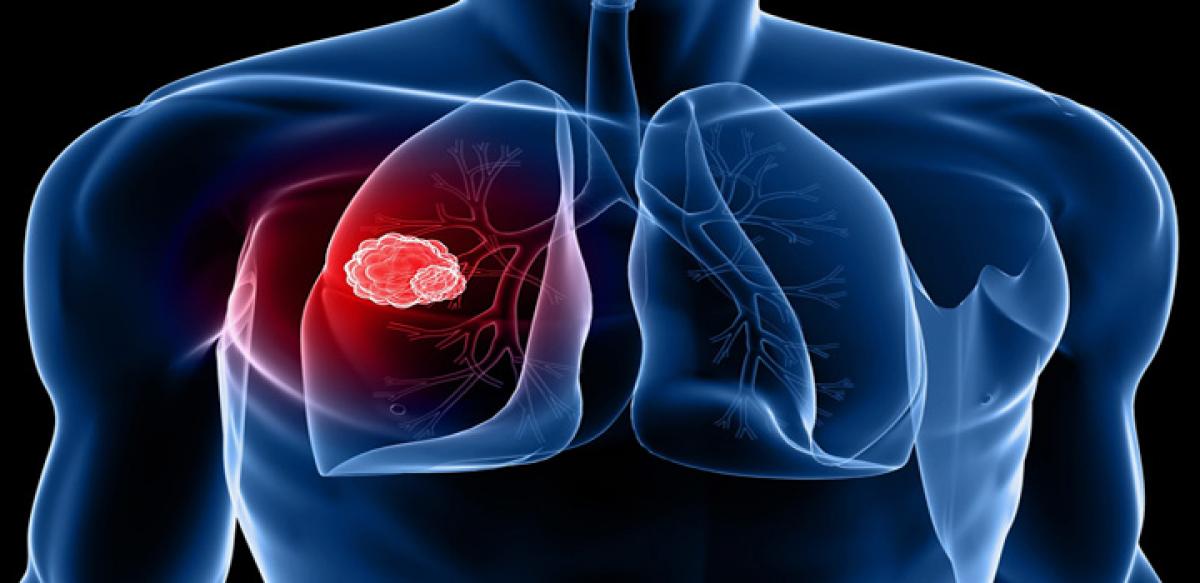Live
- Uttam releases water from Nizam Sagar for Rabi crop
- TG to be Rs 84L cr economy in 10 years: Sridhar Babu
- First TGCHE, V-Cs meet deliberates on higher education roadmap for state
- 2 senior professors to join NALSAR
- Former Principal of SPW College passes away in US
- Hyderabad: Govt out to remove electric poles, transformers on roads across city
- KCR goes into huddle with State legal eagles
- Formula E race: KTR to be arrested soon?
- Film fraternity stands with Allu Arjun
- New CUAP campus faces security challenges
Just In
Autoantibodies may lead to early detection of lung cancer


Researchers have identified autoantibodies - immune proteins found in the blood that fight one\'s own proteins - that can potentially detect lung cancer early by distinguishing between smokers with or without lung cancer. Worldwide, lung cancer causes 1.6 million deaths yearly.
Researchers have identified autoantibodies - immune proteins found in the blood that fight one's own proteins - that can potentially detect lung cancer early by distinguishing between smokers with or without lung cancer. Worldwide, lung cancer causes 1.6 million deaths yearly.
The overall five-year survival is 17 percent, which is mainly driven by the fact that 57 percent of lung cancers are diagnosed after the disease has spread, with a five-year survival of only four percent in this advanced disease setting.
If lung cancer is detected in its earliest stage, the five-year survival jumps to 55 percent, the study pointed out. Low-dose computed tomography (LDCT) is one method to detect lung cancer early in those at high risk, as defined by age and smoking history, and has been shown to reduce mortality by 20 percent.
However LDCT detects a number of lesions (nodules) that are in fact not, nor will be, cancerous. Researchers are therefore trying to discover other methods to detect lung cancer early and to distinguish between cancerous and benign LDCT detected nodules.
In this study, the researchers from International Association for the Study of Lung Cancer (IASLC), a global organisation dedicated to the study of lung cancer, screened 40 early stage lung cancer patients and 40 smoker controls to determine if the former had cancer-specific autoantibodies in their blood.
They identified 17 potential protein candidates that could discriminate between smokers with or without lung cancer. Then 137 lung cancer patients, 127 smoker controls, and 170 individuals with benign lung nodules were retested for the presence of discriminatory autoantibodies.
This helped the scientists identify a classifier of five autoantibodies that can distinguish lung cancer from smoker controls with a 30 percent sensitivity and an 89 percent specificity. They also identified a separate five autoantibody classifier that could distinguish lung cancer from benign lung nodules with a 30 percent sensitivity and an 88 percent specificity.
Sensitivity and specificity are most widely used statistics to describe the efficacy of a diagnostic test. "These autoantibodies have the potential to differentiate cancer from LDCT positive benign disease and therefore warrant further validation in a larger sample set and/or longitudinal samples,” the researchers said.The study appeared in the Journal of Thoracic Oncology.

© 2024 Hyderabad Media House Limited/The Hans India. All rights reserved. Powered by hocalwire.com






